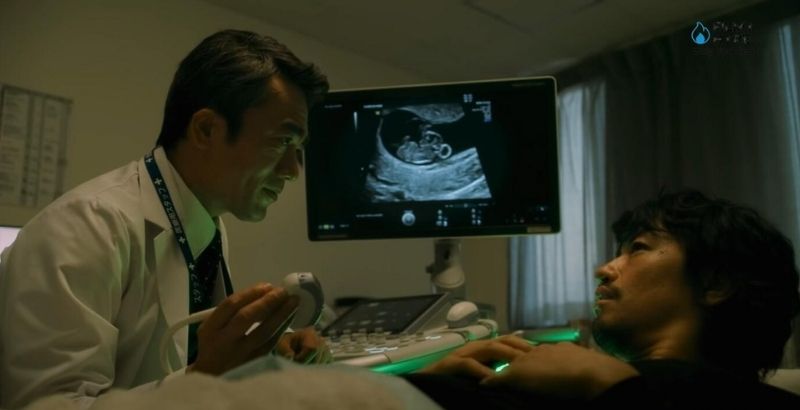
Cis male pregnancy isn’t anything new in storytelling, at least for those of us who have read omegaverse fiction. That said, it’s rare to see it in live-action, I mean we definitely have Junior where Arnold Schwarzenegger is a pregnant father, but Netflix Original He’s Expecting brings out a balance of dramady that uses the concept to interrogate pregnancy in a way that isn’t about laughs.
Directed by Yuko Hakota and Takeo Kikuchi, He’s Expecting is based on the manga He’s Expecting (Hiyama Kentaro no Ninshin) Ikuji-hen, from mangaka Eri Sakai. The film takes place in a world where men can conceive and give birth. Kentaro Hiyama (Takumi Saitoh), an elite ad man, suddenly finds out one day that he is pregnant. His partner, Aki Seto (Juri Ueno), never thought she would become a parent and isn’t necessarily ready to do so. Confused by this unexpected event, they have to find a way forward, together yes, but more importantly alone. The center of the series follows Kentaro as he faces the scrutiny of the company and society. Despite the science fiction of it all, the series watches the couple work through many problems associated with modern pregnancy and childbirth as the two decide whether to have the baby and how to move forward.
He’s Expecting is aware of its place in the conversation, calling out multiple times that our lead is only reiterating what women have said, but because he’s a man he isn’t ignored. Kentaro’s pregnancy is used to explore how difficult abortion is to access, how difficult companies make it for those starting families to progress in their careers, and ultimately confronts notions of gender and family in an overt but nuanced way.
For starters, throughout the first couple of episodes, we see Kentaro try to get an abortion, only to see that he needs his partner’s permission. With the weight of the stigma around male pregnancy, his career in jeopardy, and overall unpreparedness, abortion isn’t provided as a viable option, at least not one that he can choose on his own without the consent of his partner. In this, He’s Expecting doesn’t lose sight that abortion doesn’t affect cis-men in real life. While this is mostly handled through dialogue, like the doctor saying “for men, pregnancy is usually another person’s problem,” or Kentaro asking Aki, to act like a man usually would in the situation and just sign the papers.
This balance of current character circumstances against reality is what makes He’s Expecting work. At first, my worry was that the series would either talk down to women in the audience or forget them. Thankfully, this isn’t the case. Instead, the series investigates concepts of gender performance that essentialize experiences. While Kentaro is dealing with both health and societal issues from his pregnancy, his partner is facing a different set of stigma: what is a woman, if she isn’t a mother?
I should be clear, I don’t want children. I really don’t want children. But that decision comes with the understanding that many, even in my own family, will see me as less of a woman because of it. He’s Expecting confronts ideas of having children in a way that looks at a woman not giving birth. While others around her question if she feels like less of a woman for not carrying their child, Aki is struggling because she wasn’t sure she ever wanted to be a mother. Certainly not at the expense of her career.
And while the science fiction of a cis-male becoming pregnant with no explanation as to how this phenomenon happens (as we learn in the series, it is way more frequent than originally thought) the topics the series broaches aren’t out of this world. Whether through adoption or surrogacy, not every child is birthed by their parent, but that doesn’t make them any less family. And more importantly, it doesn’t make any mother or father less so.
The one large blindspot in this series is one it notes at the beginning of it, male pregnancy is only looked at through the lens of a cis-man. While the opening does make note of the difference between a trans-male pregnancy and a cis one, it’s one single line in episode one that makes any note of the trans community. When an online community for pregnant fathers is made, it is all about cis men, which highlights that this story isn’t made with trans people in mind. Sure, this doesn’t impact the story too much, but it does hold it back from a more inclusive narrative about gender, the harm of gender essentialism, and the importance of including trans experiences in regards to birth and parenting.
Surprisingly though, the drama and reveals that happen throughout He’s Expecting avoid melodrama. Instead, the series treats its topic and characters as a serious story to be told and not one about comedy and gags. Ultimately the series is about parenting, building family, and learning how to conceptualize both. Over the course of the series, both Kentaro and Aki investigate what family means to them, how children fit into their future, and push back against the parents in their life, asserting boundaries and pushing them to acceptance.
While it isn’t perfect, He’s Expecting beat any expectation I had for it. Instead of using male pregnancy as a shtick, the series uses it as a way to highlight things that women have been saying about pregnancy. It highlights the fear and shame that can come with pregnancy, as well as the expectations and the stigma—even if it’s not a woman at the center of it.
He’s Expecting is streaming now exclusively on Netflix.
He's Expecting
-
Rating - 6.5/106.5/10
TL;DR
While it isn’t perfect, He’s Expecting beat any expectation I had for it. Instead of using male pregnancy as a shtick, the series uses it as a way to highlight things that women have been saying about pregnancy. It highlights the fear and shame that can come with pregnancy, as well as the expectations and the stigma—even if it’s not a woman at the center of it.






